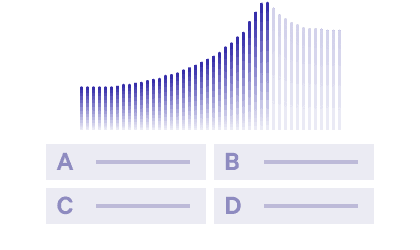How to Become a Product Manager (For Every Career Stage)
Learn how to become a product manager at every career stage, with tips on skills, education, and experience needed to advance in product management.
Posted July 9, 2025

Join a free event
Learn from top coaches and industry experts in live, interactive sessions you can join for free.
Table of Contents
Product management is a highly rewarding career path that involves driving product innovation, solving customer problems, and aligning business objectives with the products your company creates. Whether you are just entering the workforce, pivoting from another industry, or looking to advance within your career, becoming a product manager offers opportunities to lead cross-functional teams and shape the direction of key products. Understanding the job market is crucial for aspiring product managers to identify opportunities and align their skills with industry demands.
In this guide, we will walk through the key responsibilities of a product manager, the skills required, and the best steps to take based on your career stage, whether you are a college student, an early-career professional, or a mid-career professional looking to make the jump into product management. Taking the best product management courses can equip you with essential skills and practical experience, making it easier to demonstrate your abilities to potential employers.
What is Product Management?
Product management is an interdisciplinary role that brings together a range of skills and knowledge to develop, launch, and improve products. Product managers oversee the entire product life cycle, working at the intersection of engineering, marketing, sales, and customer service. They lead teams and ensure that products meet business objectives, customer needs, and market demands.
To succeed in this role, a product manager needs to have a diverse skill set. These include business acumen, strategic thinking, and a basic understanding of technical concepts. A product manager is expected to drive the product from concept to delivery and then monitor its performance and iterate on improvements based on user feedback and business results.
The Growing Demand for Product Managers
Product management has become one of the most sought-after career paths, particularly as companies aim to launch products that are competitive and meet evolving market demands. The growing demand for product management jobs highlights the unique position of Product Managers and the skills required to succeed in these roles. This growing demand stems from the need for professionals who can manage all aspects of the product life cycle, from ideation to iteration. The increasing complexity of products, combined with rapid technological advancements, has made product managers indispensable to many organizations.
Product manager’s responsibilities
- Product Strategy: Setting the vision, and roadmap, and prioritizing features based on business and customer needs.
- Development Process: Working with engineering teams to design and build the product, ensuring timely delivery.
- Cross-functional Leadership: Collaborating with teams like sales, marketing, UX, and engineering to ensure alignment throughout the product lifecycle.
- Market and Customer Insights: A product manager's role in decision-making and team empowerment involves using customer feedback and market research to drive decisions and improve the product.
Key Skills and Qualifications for Product Managers
- Strategic Thinking: A product manager must develop a vision for the product and align it with the company’s overall business strategy. This involves balancing customer needs with business objectives and market trends.
- Business Acumen: Understanding market dynamics, competition, and customer pain points is critical. Successful PMs apply this knowledge to drive product development in a way that meets business goals.
- Communication: Effective communication with cross-functional teams, executives, and customers is vital for ensuring everyone is on the same page. Highlighting relevant skills when applying for product management roles is crucial, especially for candidates transitioning from unrelated fields.
- Technical Knowledge: While not all PMs need to be engineers, having a solid grasp of the technical aspects of the product helps in making informed decisions and communicating with the engineering team.
- Data Analysis: Product managers use data to make decisions—whether it’s understanding customer behavior, measuring product success, or refining the product roadmap.
Where Do Product Managers Come From?
Product managers come from a wide variety of backgrounds, as the role requires a broad and diverse skillset. There is no one specific career path to becoming a product manager—successful product managers often come from various fields, bringing transferable skills and experience with them. Regardless of your background, becoming a product manager is about identifying the relevant skills you already have, and then building on them with further learning, experience, and certifications. For those looking to break into product management, product management courses and certifications from institutions like Product School offer a structured learning path to gain the necessary product management skills and qualifications. In the job market, employers are looking for versatile multi-skilled individuals who can manage a product team, understand the development process, and drive innovation and success.
In the end, successful product managers come from everywhere, and their transferable skills help them lead cross-functional teams and deliver products that align with both customer and business needs. By building your product management portfolio and continuously learning, you can become a product manager and carve out a highly rewarding career path in product management.
How to Break into Product Management (For Beginners)
College Graduates and Early-Stage Professionals
If you’re just starting your career or transitioning from another field, breaking into product management can seem like a challenge. However, there are several proven strategies to help you get your foot in the door.
Obtaining a product manager certification, such as The Product School's certification, can be a vital resource for individuals aiming to enter the product management field, particularly those without prior experience.
Steps to Break into Product Management:
- Start with Internships and Entry-Level Roles: Look for internships, product assistant positions, or junior roles in product management, project management, or business analysis. These positions provide hands-on experience and a foundational understanding of the product development process. Following a structured approach, or 'manager your complete step,' is crucial for aspiring product managers to navigate their entry into this field effectively.
- Leverage Transferable Skills: Many skills from other fields—such as customer service, sales, UX design, and marketing—are highly transferable to product management. For example, your experience in customer service will help you understand customer pain points, a crucial skill for any product manager.
- Build Your Product Management Portfolio: Start creating a portfolio that showcases any relevant projects or mock product ideas. This could include product research, developing a product roadmap, or defining a product’s features. You can even use personal projects or case studies to demonstrate your ability to manage a product from conception to launch.
- Take Product Management Courses and Certifications: Several online courses and certifications can fast-track your knowledge in product management. Platforms like Product School and General Assembly offer structured learning paths that cover core areas such as product strategy, user experience, and project management. Certifications like Certified Scrum Product Owner (CSPO) can also boost your credibility.
- Network and Seek Mentorship: Join product management communities, attend networking events, and connect with mentors who can guide you through your career. Platforms like LinkedIn and ProductCamp are great places to meet industry professionals.
Gaining Experience: Internships and Entry-Level Jobs
As you look for your first product management job, it’s crucial to gain experience in roles that expose you to the product development process. Start by seeking out internships or entry-level positions in product management or closely related fields, such as business analysis or project management.
Aspiring product managers should put on the product manager hat to practice relevant tasks and enhance their skills.
These roles allow you to learn the basics, such as defining product requirements, assisting with feature prioritization, and understanding how products are tested and launched. This early experience will lay the groundwork for more complex roles in the future.
Advancing in Product Management (For Mid-Career Professionals)
Transitioning from Technical to Product Management Roles
If you come from a technical background, such as software development, engineering, or UX design, you’re in a good position to transition into a product management job. Your technical expertise will be valuable, but you’ll need to expand your skillset to include strategic thinking, business acumen, and team leadership. To become a successful product manager, it is essential to develop skills in influencing and building trust within cross-functional teams.
Steps for Technical Professionals:
- Leverage Your Technical Expertise: Your deep understanding of the product development process is a major advantage. Work to understand how your technical skills translate into making strategic product decisions.
- Develop Business and Strategy Skills: Start learning about product strategy, business objectives, and market analysis. You’ll need to shift from a focus on technical execution to broader product and business considerations.
- Gain Experience Leading Teams: Product managers often lead cross-functional teams. If you’ve been a team lead or have managed projects, use these experiences to show your ability to manage multiple stakeholders, prioritize tasks, and execute a product vision.
- Expand Your Network: Connect with other product managers, attend industry events, and join relevant professional groups to expand your knowledge and access job opportunities.
Transitioning from Non-Tech to Product Management
For professionals with non-technical backgrounds—such as business, marketing, or design—product management can still be an achievable career path. You’ll need to understand the technical aspects of product development but can lean on your business skills to excel in the role.
Steps for Non-Tech Professionals:
- Gain Technical Knowledge: While you don’t need to be an engineer, it’s helpful to learn the basics of the development process. Some online resources and courses break down software development principles for non-technical people. Following a comprehensive guide, or 'product manager you're complete,' can be invaluable for non-tech professionals transitioning into product management.
- Understand Product Strategy: Read books and take courses on product strategy, competitive analysis, and market research. This knowledge is essential in defining a product’s vision and aligning it with business goals.
- Work in Cross-Functional Teams: Look for roles in marketing, business analysis, or UX that allow you to work closely with product managers. These positions help you understand the product life cycle and contribute to product decisions.
- Get Certified: As with technical professionals, certifications such as Certified Scrum Product Owner (CSPO) or Pragmatic Marketing will give you a structured learning path and help demonstrate your commitment to the field.
Excelling in Product Management (For Senior Professionals)
Mastering the Product Manager Role
For those who are already in product management, the next step is to refine your skills and take on more responsibility. Successful product managers come from diverse backgrounds and possess a variety of transferable skills, including strategic thinking, communication, and user empathy. Senior product managers must excel at driving strategy, leading teams, and making critical decisions that impact the product’s success.
Skills for Senior Product Managers:
- Strategic Thinking: At this level, you’ll be responsible for long-term product strategies. You need to understand how the product aligns with the company’s mission and growth goals.
- Data Analysis and Metrics: Senior PMs use data to inform decisions, measure success, and pivot when necessary. Being able to analyze customer behavior, track key performance indicators (KPIs), and make data-driven decisions is essential.
- Leadership and Team Management: Leading product teams, influencing stakeholders, and ensuring that everyone is aligned on product goals are critical aspects of senior product management.
- Complex Problem Solving: Senior PMs often face more complex challenges, whether it’s managing large-scale product launches, dealing with technical debt, or navigating organizational changes. You’ll need strong problem-solving skills to address these issues effectively.
High-Level Product Management Skills for Senior Roles
As a senior product manager, you’ll be expected to take ownership of larger, more complex products or entire portfolios. You must excel at:
- Visionary Leadership: Define and communicate the product vision to all stakeholders.
- Cross-functional collaboration: Manage different teams and ensure alignment across engineering, marketing, sales, and operations.
- Risk Management: Identify and mitigate risks early, whether in the product design process or during scaling efforts.
Product Management Career Paths and Specializations
Career Growth and Specialization
Product management offers various career paths. Some product managers choose to specialize in specific areas like user experience, data-driven product development, or managing complex, large-scale products. Specialization allows you to build deep expertise in a specific area, increasing your value within that niche.
Managerial Roles in Product Management
As a senior PM, you may transition to managerial roles, such as VP of Product or Chief Product Officer. In these roles, you’ll oversee multiple product teams and make high-level strategic decisions for the company.
Expert Tips for Becoming a Product Manager
Use the RICE Framework for Prioritization
One of the most challenging aspects of product management is knowing which features or tasks to prioritize. The RICE framework (Reach, Impact, Confidence, and Effort) is a simple, structured way to make this decision easier.
| Reach | Estimate how many users the feature will affect. |
| Impact | Think about how the feature will improve the user experience or business outcome. |
| Confidence | Evaluate how certain you are that the feature will deliver the expected results. |
| Effort | Determine how much time and resources will be needed to build it. |
Align Product Vision with Business Goals Early
The product vision isn’t just about creating something users love; it should also align with the company’s business objectives. Understanding how your product fits into the larger strategy of the company is key.
- Understand what the company’s priorities are—whether it's increasing revenue, improving user retention, or expanding into new markets.
- Work with stakeholders across the organization (marketing, sales, engineering) to integrate business objectives into your product decisions.Linking the product strategy to clear business outcomes helps ensure that you’re building the right features and making an impact that matters.
Create a Customer Empathy Map to Understand User Needs
A Customer Empathy Map helps you move beyond basic user personas to a deeper understanding of your customer’s pain points, needs, and behaviors. Break down insights into these categories:
| What they think | What are their key thoughts or concerns about your product? |
| What they feel | What emotional drivers are at play when they use your product? |
| What they hear | What are they hearing from peers or in the media about the product or category? |
| What they do | How do they interact with your product or similar products? |
Keep Teams Aligned with Transparent Communication
As a product manager, you need to be the main point of communication between different teams—engineering, design, marketing, etc. Make sure everyone is on the same page by:
- Holding regular syncs with all key stakeholders to check in on progress, issues, and any shifts in priorities.
- Make your roadmap visible to all relevant teams, so everyone can see how the product is progressing and where they fit into the bigger picture.
- Clarifying roles: Clearly define who makes which decisions. For example, engineering might be in charge of technical feasibility, while marketing handles market validation.This approach keeps everyone moving in the same direction and helps avoid misalignment, which can derail projects.
Use Post-Launch Feedback to Improve the Product Continuously
Product management doesn’t end when the product launches. The best PMs keep improving the product after it’s out there.
- Set up in-product surveys or use tools like Hotjar to gather user feedback directly.
- Use analytics to track how users interact with the product. Look for drop-off points or areas of friction that could be improved.
- Create an open forum where users can submit feedback or ask questions, and engage with them to show you value their input.Continuous feedback helps you make data-driven improvements that keep the product relevant and aligned with user needs.
Final Thoughts
Becoming a product manager requires a mix of skills, experience, and adaptability. Regardless of your background, whether it’s in technical roles, business, marketing, or UX design, the key is to build a broad and diverse skillset that aligns with the product manager role. Gaining relevant experience, pursuing product management courses, and strengthening your strategic thinking and business acumen are essential steps to break into the field. As you work through the product life cycle, develop your product strategy, and learn to manage teams, you’ll build a product management portfolio that sets you up for long-term success. Whether you're just starting out or advancing your career, staying focused on learning and growth will help you become a product manager and excel in a highly rewarding career path.
Work with Product Management Coaches
Work with a Product Management Coach to improve your skills, prepare for interviews, and plan your next career step. Whether you’re starting or aiming higher, coaching can help you succeed.
Related Articles
Take the opportunity to learn from industry experts, gain new perspectives, and enhance your skills with these related product management articles:
- The Most Common Technical Product Manager Interview Questions -- and How to Answer Them
- What is Product Management?
- What Is a Product Lead and Why Is It So Important?
- The Product Execution Interview: Ultimate Guide (With Common Questions)
- The 50 Most Common Product Manager Interview Questions (With Sample Answers)
FAQs
What qualifications do I need to be a product manager?
- To become a product manager, you'll typically need a combination of education, experience, and key skills. A bachelor’s degree in a relevant field, such as business, engineering, or marketing, is often required. In addition to formal education, having experience in project management, marketing, or UX design can be beneficial. Most importantly, product managers need strong communication skills, business acumen, and a solid understanding of the product development process. Certifications in product management or project management, such as Certified Scrum Product Owner (CSPO) or Pragmatic Marketing, can also help demonstrate your expertise.
What does it take to become a product manager?
- Becoming a product manager requires a blend of technical, business, and soft skills. You must be able to think strategically, analyze market trends, and make data-driven decisions. Strong communication skills are crucial because you’ll need to collaborate with teams across engineering, marketing, and sales. Experience in project management or related roles, such as UX design or business analysis, can give you the foundation needed for a product management role. Continuous learning and staying updated on industry trends are key to excelling in this position.
Is it hard to get into product management?
- Breaking into product management can be competitive, but it’s not impossible. Many people start by gaining experience in related fields like marketing, project management, or business analysis. If you’re coming from a technical background, transitioning into a product management role may be smoother due to your understanding of the development process. Building a strong portfolio of relevant projects, earning certifications, and networking with other product managers can increase your chances of getting hired. Starting with internships or junior roles in product management is a practical approach for beginners.
How can I start my career as a product manager?
- To start a career in product management, begin by gaining relevant experience in roles that interact with the product development process, such as project management, business analysis, or UX design. Consider taking product management courses or certifications to build your knowledge. A strong portfolio that showcases any relevant projects will help demonstrate your skills. You can also look for internships or junior product management positions to get hands-on experience. Networking with other product managers and seeking mentorship can also help you get started in the field.






























